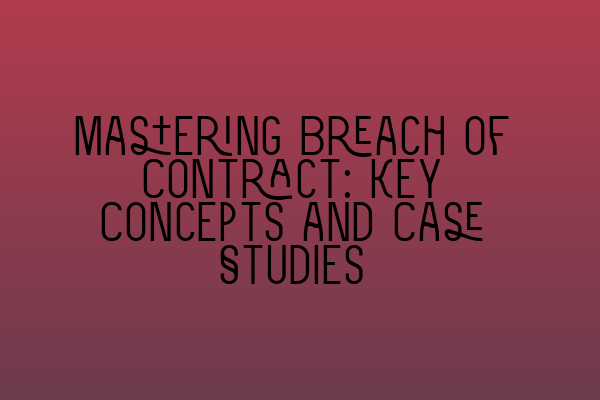Mastering Breach of Contract: Key Concepts and Case Studies
Introduction
In the world of contract law, one of the most critical issues that can arise is a breach of contract. A breach occurs when one party fails to fulfill their obligations as outlined in the contractual agreement. While this may seem like a straightforward concept, understanding the key concepts and nuances surrounding breach of contract is vital for both solicitors and individuals seeking legal guidance. In this blog post, we will explore the essential elements of breach of contract, delve into relevant case studies, and provide guidance on how to navigate this complex area of law.
The Elements of Breach of Contract
When assessing a potential breach of contract, it is essential to understand the key elements involved:
1. Valid Contract: A valid contract must exist between the parties involved. This requires mutual consent, offer, acceptance, consideration, and intention to create legal relations.
2. Breach: The breaching party must fail to fulfill their contractual obligations. There are three types of breaches: anticipatory, actual, and fundamental.
3. Damages: The non-breaching party must have suffered damages as a result of the breach. These damages may be compensatory, consequential, nominal, or liquidated.
4. Causation: The breach of contract must be the direct cause of the damages suffered by the non-breaching party. It is crucial to establish a causal link between the breach and the resulting harm.
Case Studies
To better understand how breach of contract operates in practice, let’s examine some key case studies:
1. Hadley v. Baxendale (1854): This landmark case established the “foreseeability” rule for damages. The court held that damages must have been reasonably foreseeable at the time of contracting to be recoverable. This ruling has since become a cornerstone of contract law.
2. Hochster v. De la Tour (1853): In this case, the court recognized the concept of an anticipatory breach. The defendant had wrongfully terminated a contract before the agreed-upon start date. The court held that the plaintiff could immediately sue for damages, even before the contract’s performance was due.
3. Radford v. De Froberville (1977): This case illustrates the importance of fundamental breach. The court held that a fundamental breach of contract allows the innocent party to terminate the contract and claim damages. In this case, the defendant’s failure to deliver goods as agreed constituted a fundamental breach, entitling the plaintiff to terminate the contract.
Navigating Breach of Contract
When faced with a breach of contract situation, it is crucial to navigate the legal landscape carefully. Here are some key considerations:
1. Review the Contract: Thoroughly review the contract in question to understand the obligations and rights of the parties involved. This will provide a clear framework for assessing whether a breach has occurred.
2. Gather Evidence: Compile all relevant evidence, including correspondence, invoices, and any other documentation that supports your claim. This evidence will be crucial in establishing the breach and the resulting damages.
3. Consult a Solicitor: Seek legal advice from a competent contract law solicitor. They will guide you through the process, assess the strengths and weaknesses of your case, and provide you with a strategic course of action.
4. Negotiate or Litigate: Depending on the circumstances, it may be possible to negotiate a resolution with the breaching party. If negotiations fail or are not appropriate, litigation may be the next step. Your solicitor will advise you on the most suitable approach.
Conclusion
Mastering breach of contract is essential for both solicitors and individuals navigating the complex world of contract law. Understanding the elements of breach, studying relevant case studies, and seeking legal guidance when needed are vital steps towards effectively addressing breaches of contract. By doing so, parties can protect their rights, seek appropriate remedies, and ensure the enforceability of contractual agreements.
Related Articles:
If you are preparing for the SQE 1 exam, check out our SQE 1 Practice Exam Questions that will help you test your knowledge and sharpen your skills.
For comprehensive SQE 1 preparation, explore our SQE 1 Practice Mocks FLK1 FLK2 courses designed to provide you with the necessary knowledge and practice to succeed.
For SQE 2 preparation, we offer a range of dedicated courses to help you excel in the exam. Check out our SQE 2 Preparation Courses to find the right fit for your needs.
Looking for SQE 1 preparation courses to enhance your knowledge and skills? Explore our SQE 1 Preparation Courses to find valuable resources and support.
Stay informed about the latest SRA SQE exam dates by visiting our SRA SQE Exam Dates page. Plan your preparation accordingly to ensure you meet the requirements and deadlines set by the regulatory authority.
Remember, knowledge is power when it comes to mastering breach of contract. Stay informed, seek expert advice, and empower yourself to navigate this essential area of law effectively.
